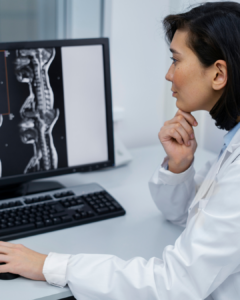Living Beyond Limits: Spinal Cord Injuries After Car Accidents
Car accidents are among the leading causes of spinal cord injuries (SCI), leaving victims with pain, reduced mobility, or even lifelong disability. Unlike broken bones or cuts that heal with time, damage to the spinal cord can disrupt nerve signals between the brain and body, leading to paralysis, loss of sensation, and other serious complications.
At Specialty Care Clinics, we specialize in diagnosing and treating spinal cord injuries after car accidents, helping patients regain independence, mobility, and quality of life.

Why Spinal Cord Injuries Are So Serious After Car Accidents
The spinal cord is the body’s information highway, carrying messages between the brain and the rest of the body. Damage from a car crash can have far-reaching consequences:
- Permanent paralysis if nerve pathways are disrupted.
- Loss of bladder and bowel control, drastically affecting quality of life.
- Respiratory issues if the injury affects the cervical spine (neck region).
- Chronic pain and muscle spasms from nerve damage.
This is why even a minor accident causing back pain should be evaluated immediately at an auto injury clinic in Texas.
Types of Spinal Cord Injuries After Car Accidents
- Complete SCI – No sensation or motor control below the injury site (can cause paraplegia or quadriplegia).
- Incomplete SCI – Partial loss of movement or sensation.
- Cervical Spine Injuries – Affect neck and may cause quadriplegia.
- Thoracic Spine Injuries – Affect chest and abdomen control.
- Lumbar & Sacral Injuries – Affect legs, hips, and bladder function.
Each type requires specialized spinal cord injury treatment for best outcomes.
Symptoms You Should Never Ignore After a Car Accident
Even if you walk away from a crash, spinal damage may not show immediately. Watch for:
- Numbness or tingling in arms/legs
- Loss of movement in any body part
- Difficulty breathing or coughing
- Loss of bladder/bowel control
- Extreme back or neck pain
- Muscle weakness or spasms
These red flags demand immediate evaluation at a specialized auto injury treatment center.
Diagnosis of Spinal Cord Injuries
At Specialty Care Clinics, we use:
- Neurological exams to assess reflexes and motor function
- MRI & CT scans to detect fractures, swelling, or compression
- Electromyography (EMG) to test nerve communication
- X-rays for spinal alignment and bone injuries
Treatment Options for Spinal Cord Injuries
Treatment depends on severity, but common options include:
- Emergency stabilization: Neck braces or traction to prevent further damage.
- Surgery: To remove bone fragments, herniated discs, or stabilize the spine.
- Medications: To reduce swelling and prevent infection.
- Rehabilitation therapy: Physical, occupational, and speech therapy to restore function.
- Assistive devices: Wheelchairs, braces, and mobility aids.
At our auto injury clinics in Texas, we create personalized recovery plans for every patient.
Long-Term Complications of Untreated SCI
Without proper care, spinal cord injuries can lead to:
- Chronic pain and muscle spasms
- Respiratory and circulatory issues
- Loss of sexual function
- Frequent infections (urinary or respiratory
- Mental health challenges like depression or anxiety
Recovery and Rehabilitation After Spinal Cord Injuries
Recovery is often a long journey. With specialized rehabilitation at Specialty Care Clinics, patients receive:
- Physical therapy to strengthen muscles and improve mobility
- Occupational therapy to relearn daily skills
- Psychological support for mental well-being
- Adaptive technology to promote independence
Many patients can live fulfilling lives with the right medical care and lifestyle adjustments.
Prevention Tips: Protecting Your Spine on the Road
- Always wear your seatbelt properly
- Adjust headrests to support the neck
- Drive cautiously and avoid distractions
- Maintain proper posture when driving
- Seek immediate medical help after any crash
Conclusion
Spinal cord injuries after car accidents are life-changing, but early diagnosis, advanced treatment, and long-term rehabilitation can make recovery possible. At Specialty Care Clinics, we provide comprehensive spinal cord injury treatment—from emergency care to rehabilitation—ensuring patients get the support they need at every stage.
Need Auto Accident Spinal Injury Treatment in Texas?
Visit: Specialty Care Clinics – Auto Injury Care
Call: (972) 865-4454
FAQs
Q1: Can spinal cord injuries heal completely?
Some incomplete injuries improve with treatment, but complete injuries often cause permanent damage. Rehabilitation helps maximize recovery.
Q2: How soon should I see a doctor after a car accident?
Immediately—even if symptoms seem mild. Delays can worsen spinal cord damage.
Q3: What’s the difference between paraplegia and quadriplegia?
Paraplegia affects the lower body, while quadriplegia affects all four limbs.
Q4: Is surgery always required for spinal cord injuries?
Not always. Some cases can be managed with medication, therapy, and monitoring, while severe cases may need surgery.
Q5: Can rehabilitation improve life after SCI?
Yes. With therapy, adaptive tools, and support, patients can regain independence and live fulfilling lives.
